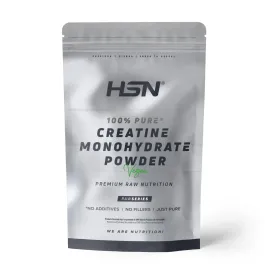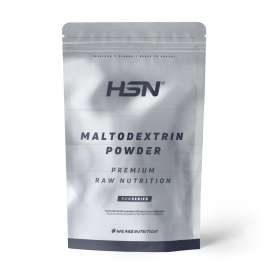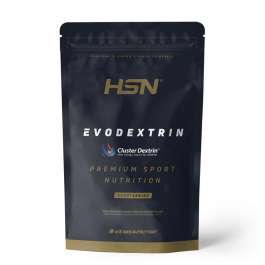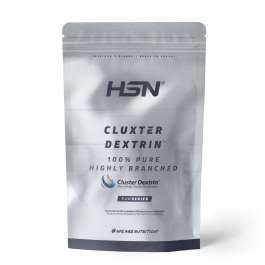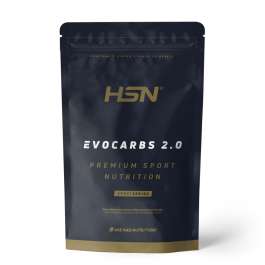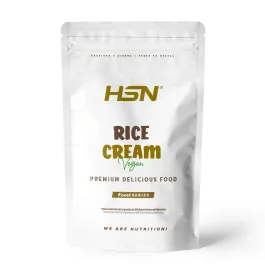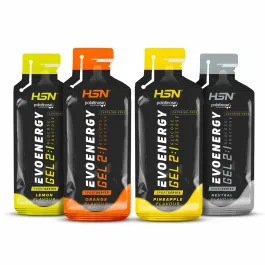
DEXTROSE POWDER
Dextrose powder. High Glycemic Index Carbohydrate. Suitable for vegans.




- 100% Dextrose powder.
- Monohydrate form, better dissolution.
- No additions.
- Suitable for vegans and vegetarians.
Table of contents
What is Dextrose?
Dextrose Powder by RawSeries is a powered food of Dextrose monohydrate.
Dextrose is glucose with a linear rather than a cyclic hydrocarbon chain; it provides a high amount of energy (4kcal/g) and is rapidly absorbed in the gut, with a Glycaemic Index of 100.
Dextrose powder is a food obtained from the degradation of starch, and is 100% vegan.
Dextrose Powder properties
Carbohydrates
- Carbohydrates contribute to the recovery of normal muscle function (contraction) after high intensity or long duration physical exercise leading to muscle fatigue and depletion of stored glycogen in skeletal muscles.1
Why take Dextrose powder?
Dextrose
Dextrose is a monosaccharide, a simple carbohydrate.
Absorption
'The Glycaemic Index, which is a nutritional property of carbohydrate-rich foods, is defined as the increase in the area under the blood glucose response curve after consuming a 50g serving of glycaemic carbohydrate from a food test expressed as the percentage response to the same amount of carbohydrate from a standard reference taken by the same subject' (FAO/WHO, 1998 cited in EFSA 2010).
The reference for the glycaemic index is always glucose (dextrose), with a value of 100, a high glycaemic index showing that its absorption is rapid.
Why buy Dextrose in HSN?
100% Pure
HSN's product is a food, 100% Dextrose monohydrate, and contains no other ingredients (or additives) in its composition.
Less sweet than sugar
One of the virtues of 100% pure dextrose is that its sweetening value is half that of table sugar.
Monohydrate, better solubility
The presentation of the food is dextrose monohydrate (C6H12O6 x H2O).
The addition of a water molecule to dextrose reduces its moisture uptake than in anhydrous form, making it easier to preserve and increasing the shelf life of the food.
Similarly, dextrose monohydrate improves its solubility profile in polar media (such as water or juices), so it dissolves instantly.
Forget about finding sediment in your intra-workout bottle!
Vegan
Dextrose is obtained from the degradation of starch present in maize.
Starch is a huge polymer made up of thousands of glucose units, so its hydrolysis releases dextrose which can then be processed into food.
It is vegetable, suitable for vegan and vegetarian diets.
How does Dextrose taste?
Dextrose has an intensely sweet taste.

Which combine Dextrose with?
Goes great with:
Bibliographical references
- EFSA (2010). Scientific Opinion on the substantiation of health claims related to carbohydrates that induce low/reduced glycaemic responses (ID 474, 475, 483, 484) and carbohydrates with a low glycaemic index (ID 480, 481, 482, 1300) pursuant to Article 13(1) of Regulation (EC) No 1924/2006. EFSA Journal 8(2):1491.
Scientific bibliography
- Boron, W., Boulpaep, E. (Eds.) (2017). Medical physiology: a cellular and molecular approach. Philadelphia, PA: Saunders/Elsevier.
- Dahl, H. A., Rodahl, K., Stromme, S. B., & Åstrand, P.-O. (2003). Textbook of work physiology: physiological bases of exercise (4th ed.).
- Jeukendrup, A. (2014). A step towards personalized sports nutrition: carbohydrate intake during exercise. Sports Medicine (Auckland, N.Z.), 44 Suppl 1(Suppl 1), S25-33.
- Thomas, D. T., Erdman, K. A., & Burke, L. M. (2016). American College of Sports Medicine Joint Position Statement. Nutrition and Athletic Performance. Medicine and Science in Sports and Exercise, 48(3), 543–568.
1 The beneficial effect is obtained by consuming carbohydrates from all sources at a total intake of 4 g per kg body weight, in doses taken within four hours (or at most six hours) after the end of high intensity or long duration physical exercise leading to muscle fatigue and depletion of stored glycogen in skeletal muscles.
Nutritional FactsDEXTROSE POWDER 1Kg NO FLAVOUR |
| per 100gper serving |
| Serving size: 1 scoop of 70ml (50g) | ||
| Servings per container: 20 | ||
| Amount per 100g | ||
|---|---|---|
| Energy Value | 1695kJ/399kcal | |
| Fat | 0g | |
| of which saturated | 0g | |
| Carbohydrates | 100g | |
| of which sugars | 100g | |
| Proteins | 0g | |
| Salt | 0.01g | |
| Protein calculated in dry matter (nitrogen *6.25) |
Ingredients
Dextrose monohydrate.
Warnings
Store in a cool (below 25°C), dry and dark place. The scoop/product quantity equivalences (grams or milligrams) are indicative, as the density of powdered products may vary between flavours and batches. We recommend the use of a kitchen scale in cases where precise dosing is required. It is necessary to maintain a varied and balanced diet and a healthy lifestyle. Health claim awaiting European authorization.

How to take DEXTROSE POWDER 1Kg NO FLAVOUR
Mix 1 scoop of 70ml (approx. 50g) with 300-400ml of water.
The product reviews and opinions published reflect only the customers’ views and experiences. HSN does not verify or endorse such comments or claims, and is not responsible for the content provided in the reviews. Statements regarding food supplements have not been evaluated by the EFSA (European Food Safety Authority) and are not intended to diagnose, treat, cure, or prevent any disease or medical condition.
The product reviews and opinions published reflect only the customers’ views and experiences. HSN does not verify or endorse such comments or claims, and is not responsible for the content provided in the reviews. Statements regarding food supplements have not been evaluated by the EFSA (European Food Safety Authority) and are not intended to diagnose, treat, cure, or prevent any disease or medical condition.

A satisfied customer says:
Key product.
Cesar 24/01/2024
An effective and efficient product. Great for pre-workout for good pumps and energy, and perfect for post-workout. Super convenient to reach the daily calorie target in volume, as it provides carbohydrates only.
Show original language
A critical customer says:
Good value for money
Borja 12/08/2023
Good value for money. The only drawback is that the packaging is quite uncomfortable both for serving and storing.
Show original language-
Good
Sergio 30/12/2025
It fulfills what was promised a great contribution in case it was neutral flavor very well to combine with different liquids.
Show original languageWas the review helpful? Be thefirst one to rate the review -
Extra energy
DoubleD 16/12/2025
I think dextrose has its place in sports. I use it sometimes in combination with eaas intraworkout and with whey protein after a workout.
Was the review helpful? Be thefirst one to rate the review -
Help
Óscar 02/12/2025
For moments of high intensity, take before going very well does not taste bad and dissolves very well.
Show original languageWas the review helpful? Be thefirst one to rate the review -
Great product
David 09/11/2025
Great value for money product. The presentation is ideal and the flavor is as expected. It meets my expectations. Definitely a product to buy again.
Show original languageWas the review helpful? Be thefirst one to rate the review -
Good source of glucose
Raúl 04/11/2025
I purchased HSN's dextrose powder to use during and after training and it works great. It dissolves easily, tastes good and I notice that I recovered energy fast. It's pure, no additives, and mixes well with my protein shake or just water. And for the price, what more could I ask for?
Show original languageWas the review helpful? Be thefirst one to rate the review
No reviews found with filters applied.
{title}
{nickname-date}
{detail}
{review-link} EN - EUR
EN - EUR Albania
Albania  Austria
Austria  Belgique
Belgique  Bosnia and Herzegovina
Bosnia and Herzegovina  Bulgaria
Bulgaria  Canadá
Canadá  Chile
Chile  Chipre
Chipre  Corea (la República de)
Corea (la República de)  Croacia
Croacia  Czechia
Czechia  Denmark
Denmark  Deutschland
Deutschland  Eslovaquia
Eslovaquia  Eslovenia
Eslovenia  Estonia
Estonia  Finland
Finland  France
France  Greece
Greece  Hungary
Hungary  Iceland
Iceland  Ireland
Ireland  Islas Feroe
Islas Feroe  Italia
Italia  Japan
Japan  Latvia
Latvia  Lithuania
Lithuania  Luxembourg
Luxembourg  Macedonia
Macedonia  Malta
Malta  Marruecos
Marruecos  Mónaco
Mónaco  Montenegro
Montenegro  Netherlands
Netherlands  Noruega
Noruega  Poland
Poland  Portugal
Portugal  Romania
Romania  Schweiz
Schweiz  Serbia
Serbia  South Africa
South Africa  Suecia
Suecia 


 View full analysis
View full analysis 